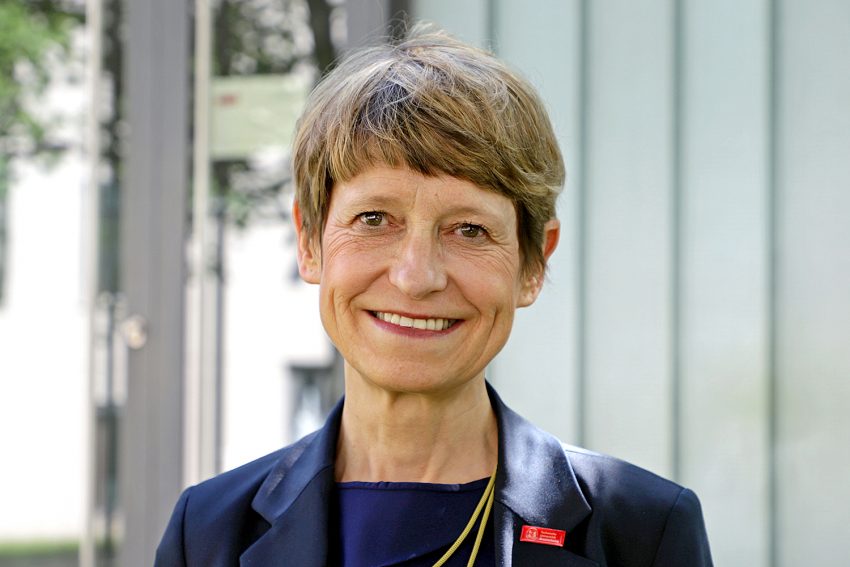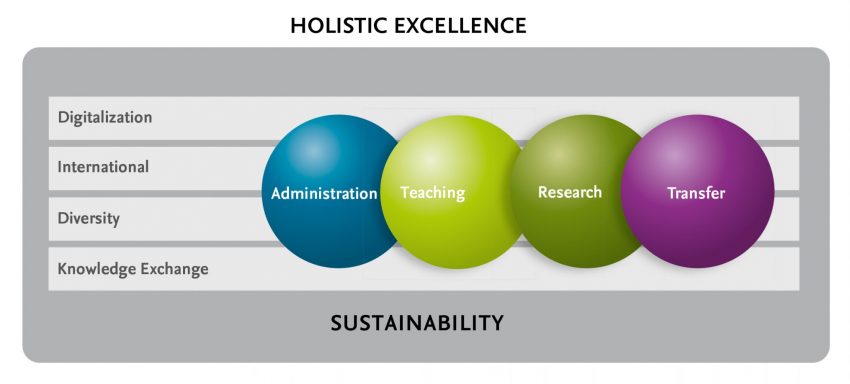Working together, will enable us to create the prerequisites for achieving holistic excellence Our President’s spotlights
Even before I assumed office, I was impressed by the dynamism and agility exhibited by Technische Universität Braunschweig. The ‘we move’ campaign resulted in the generation of a wonderful team spirit and, despite the huge effort required, all members of the university demonstrated a cohesion that was quite remarkable. We need to take the developments in past years seriously and find new participatory ways of appropriately moulding our institute of higher education, identifying its potentials and ensuring that it remains on the path to success. In my most recent Spotlight article ‘Embarking on a new beginning and shaping the future together’ I set out my thoughts on how we could together safeguard the future of TU Braunschweig and progress further. In the following, I outline in more detail the main instrument that is to be employed in this respect – the ‘University Development Initiative 2030’.
The ‘University Development Initiative 2030’
We – as a University with highest standards for excellent research, teaching and as an employer- will need to overcome numerous challenges in future. The demands placed on universities are constantly increasing – not only in terms of the ever more complex research topics and new teaching formats, but also when it comes to administration and the knowledge-related transfer activities that are so important to us. We need to face up to these so that our values, strategic aspirations and goals do justice to our aim to achieve holistic excellence. What is to serve as our guideline as we work together towards our objective is our ‘University Development Initiative 2030’.
We initiated the corresponding participative process back in September 2021 based on existing concepts, including the strategy white paper that we submitted last year to the Academic Advisory Council of Lower Saxony (WKN) at the request of the Ministry of Science and Culture (WMK), supplemented by my guiding principle, the model of holistic excellence. This provides the framework within which our actual ideas on how to achieve our defined goals can be specified and implemented.
Every member and every step counts
The nature of this university development process naturally requires us to actually characterise exactly what form a holistically excellent university should take. Predicated on previous strategic processes, it is now our task to generate new stimuli and outline the requirements for a coherent approach to planning that will result in the establishment of holistic excellence through our university. Our development plan will consist of both quantitative and qualitative core elements that will provide us with a framework and basis of orientation for future projects, such as major collective undertakings, coordinated programmes, future appointments and participation in the Excellence Initiative. Our ambition is to ensure that the reputation of our outstanding research is further enhanced and that the whole of TU Braunschweig is elevated to a level at which all of us will be able to achieve exceptional results. But it is together with all members that I plan to actively pursue this goal. I thus intend to approach each and every member of TU Braunschweig with regard to this process and involve all of you in it. One way or another, we need to assume common responsibility for the development of our university. All of us must contribute to shaping our future. That also means that we must all shoulder obligations on a daily basis that will enable us to work towards our objective of making TU Braunschweig a comprehensive model of excellence, irrespective of how minor the achieved progress in each case may be.
Where we are at present
I would like to provide a brief overview of the current status of the three-phase university development process, which was inititiative in in fall 2021 and includes three phases. In the already completed phase I, nine groups consisting of representatives of the departments, the student body, administration personnel, the central facilities and staff units considered possible ways of working together to promote the aspects of future concepts, research, academic and study affairs, knowledge transfer together with university culture and framework conditions. The results of this served as the material input for the future workshops of phase II. Here, the representatives of the nine groups of phase I discussed these collectively and developed them further in committees and subject-specific work groups. In phase II, there was a special focus on the four interdisciplinary topics of digitalisation, internationalisation, equality and diversity and knowledge exchange in order to identify potential synergies in all these areas. There was also especial focus on the principle of sustainability that will in future have an even greater influence on our activities. In the concluding phase II workshop – that we have had to postpone to late May as a result of the COVID-19 pandemic – the results will be debated with university-external consultants, after which the planned further strategy will be presented.
We have already begun with phase III in mid-February so that, once the results and strategic measures have been appropriately defined, we can draw up the outline of a development plan for all departments and central units. In a workshop involving the President’s Office and the various deans, additional input for this future outline with regard to the aspects of ‘Research’, ‘Transfer’, ‘Administration’ and ‘Academic and Student Affairs’ was obtained. I am currently visiting the faculty councils to provide them with information on the intermediate situation and discuss this with them. My hope is – and I would like to see this happen – that this discussion will be continued within departments at all levels and as many members as possible will be involved.
We need the participation of all members of the university if the concepts for the various topics are to be set in motion. It is for this reason that we have involved, from the very inception of the process, the administration-relevant institutions of the staff who provide support to the academic personnel. In order to additionally facilitate integration of the input of the centralised and decentralised administration, we have drawn up a concept for an additional series of workshops for members employed in administration. I herewith cordially invite all those active in administration to take part and thus provide us with further valuable contributions that will enhance the process. Without you, we will be unable to achieve our goals.
Planned forms of participation
What I have in mind is to arrange for all members of TU Braunschweig to have the opportunity to take part in these shared processes and contribute to the success of our university even beyond the objectives of the ‘University Development Initiative 2030’. I consider your feedback to be of considerable importance. One of the first ways I hope to meet with you and initiate the discourse with you will be through the regular consultation sessions I will be instituting from late April at which everyone will be welcome.
I would like to take this opportunity to thank all those who have already contributed to our university development processes and for their candour during the discussion sessions of the individual phases. I find the extraordinary commitment shown by our members and their concern for our university to be highly encouraging. This is one of our main strengths of which we can be justly proud.


